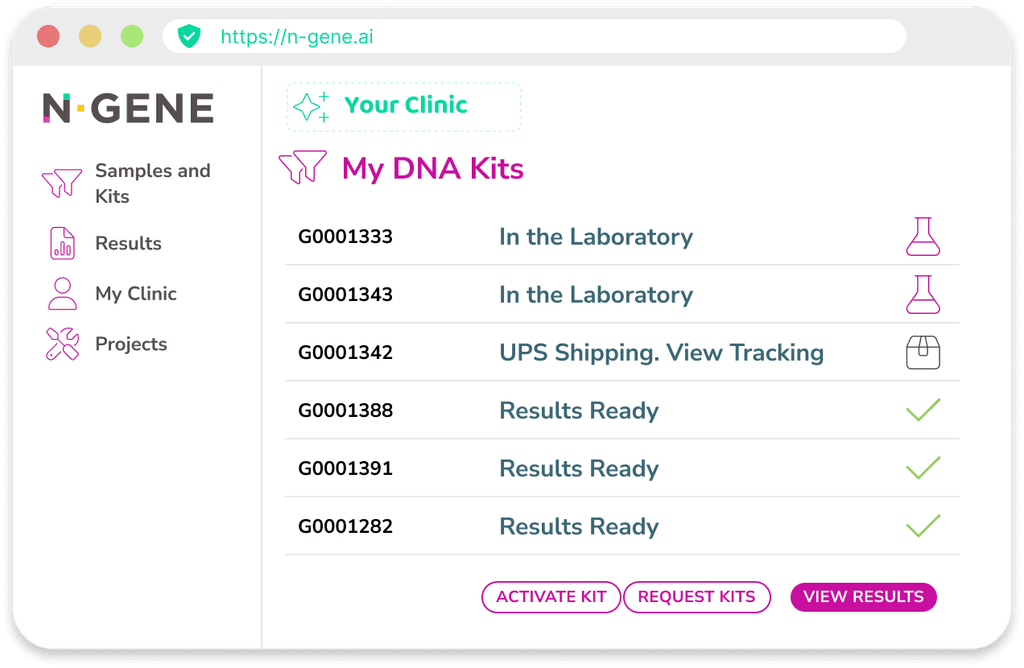The genetic solution for Oncologists
The genetic solution for Oncologists
The genetic solution for Oncologists
Integrate genetics into your practice with N-Gene, the software for oncology professionals that offers personalized solutions to your clients with genetic studies and helps grow your business.
Integrate genetics into your practice with N-Gene, the software for oncology professionals that offers personalized solutions to your clients with genetic studies and helps grow your business.

The most comprehensive
Explore our solutions
The most comprehensive
Explore our solutions
Multiple variants
Explore the predisposition and protection to:
Endocrine and reproductive system in oncology
Endometrial Cancer
The predisposition to endometrial cancer may be influenced by genetic variants in genes such as PTEN, MLH1, and PMS2, which are important in DNA repair and the regulation of cell growth. Mutations in these genes can lead to uncontrolled cell growth in the endometrium, increasing the risk of cancer development.
Breast Cancer
The susceptibility to breast cancer may be associated with genetic factors such as variants in genes like CHEK2, ATM, and PALB2, which may play a role in increasing the risk, although each of these genes contributes to a lesser extent to the overall risk. In addition, acquired somatic alterations in genes involved in cell cycle regulation, DNA repair, and hormonal signaling may also contribute to the development of this type of cancer. These include mutations in genes such as PIK3CA, TP53, and HER2, which can occur during a person's life and are not inherited from parents.
Ovarian Cancer
The predisposition to ovarian cancer may be related to mutations in genes such as BRCA1, BRCA2, and TP53. These mutations can compromise genomic integrity and cell cycle regulation, facilitating the development of cancerous cells in the ovaries.
Pancreatic cancer
Pancreatic cancer may be associated with mutations in genes such as BRCA2, KRAS, CDKN2A, and TP53. KRAS is one of the most common mutations in pancreatic tumors, driving uncontrolled cell growth. BRCA2, in addition to its role in breast and prostate cancer, also contributes to the risk of pancreatic cancer by affecting DNA repair. Variations in these genes may predispose to early and aggressive disease development.
Prostate cancer
The predisposition to prostate cancer may be influenced by variants in genes such as BRCA1, BRCA2, HOXB13, and genes of the HLA system. BRCA2, in particular, is associated with a higher risk of developing aggressive forms of the disease. Additionally, variants in genes that regulate androgen signaling, such as the androgen receptor (AR), may influence the progression of prostate cancer.
Thyroid Cancer
The predisposition to thyroid cancer may be influenced by genetic variants in genes such as RET, BRAF, and PTEN. Mutations in RET and BRAF are particularly associated with different types of thyroid cancer, including medullary carcinoma and papillary carcinoma, respectively.
Uterine Leiomyoma
The predisposition to develop uterine leiomyomas may be associated with variants in genes such as MED12, HMGA2, and COL4A5/COL4A6. These genes are involved in the regulation of smooth muscle growth and the extracellular matrix, contributing to the development of these benign tumors of the uterus.
Endocrine and reproductive system in oncology
Endometrial Cancer
The predisposition to endometrial cancer may be influenced by genetic variants in genes such as PTEN, MLH1, and PMS2, which are important in DNA repair and the regulation of cell growth. Mutations in these genes can lead to uncontrolled cell growth in the endometrium, increasing the risk of cancer development.
Breast Cancer
The susceptibility to breast cancer may be associated with genetic factors such as variants in genes like CHEK2, ATM, and PALB2, which may play a role in increasing the risk, although each of these genes contributes to a lesser extent to the overall risk. In addition, acquired somatic alterations in genes involved in cell cycle regulation, DNA repair, and hormonal signaling may also contribute to the development of this type of cancer. These include mutations in genes such as PIK3CA, TP53, and HER2, which can occur during a person's life and are not inherited from parents.
Ovarian Cancer
The predisposition to ovarian cancer may be related to mutations in genes such as BRCA1, BRCA2, and TP53. These mutations can compromise genomic integrity and cell cycle regulation, facilitating the development of cancerous cells in the ovaries.
Pancreatic cancer
Pancreatic cancer may be associated with mutations in genes such as BRCA2, KRAS, CDKN2A, and TP53. KRAS is one of the most common mutations in pancreatic tumors, driving uncontrolled cell growth. BRCA2, in addition to its role in breast and prostate cancer, also contributes to the risk of pancreatic cancer by affecting DNA repair. Variations in these genes may predispose to early and aggressive disease development.
Prostate cancer
The predisposition to prostate cancer may be influenced by variants in genes such as BRCA1, BRCA2, HOXB13, and genes of the HLA system. BRCA2, in particular, is associated with a higher risk of developing aggressive forms of the disease. Additionally, variants in genes that regulate androgen signaling, such as the androgen receptor (AR), may influence the progression of prostate cancer.
Thyroid Cancer
The predisposition to thyroid cancer may be influenced by genetic variants in genes such as RET, BRAF, and PTEN. Mutations in RET and BRAF are particularly associated with different types of thyroid cancer, including medullary carcinoma and papillary carcinoma, respectively.
Uterine Leiomyoma
The predisposition to develop uterine leiomyomas may be associated with variants in genes such as MED12, HMGA2, and COL4A5/COL4A6. These genes are involved in the regulation of smooth muscle growth and the extracellular matrix, contributing to the development of these benign tumors of the uterus.
Digestive system in oncology
Digestive system in oncology
Excretory and nervous system
Excretory and nervous system
Immune system
Immune system
Respiratory system
Respiratory system
Integumentary and skeletal system
Integumentary and skeletal system
Save time
Save time
Explore genetic data easily
Register your patients
Request kits and pickups
Generate reports in PDF
Receive AI-powered insights
Register your patients
Monitor the progress of your clients' samples efficiently: assign an alias to every sample and track its status instantly

Register your patients
Request kits and pickups
Generate reports in PDF
Receive AI-powered insights

Register your patients
Monitor the progress of your clients' samples efficiently: assign an alias to every sample and track its status instantly
Register your patients
Request kits and pickups
Generate reports in PDF
Receive AI-powered insights

Register your patients
Monitor the progress of your clients' samples efficiently: assign an alias to every sample and track its status instantly
Shall we talk?
Shall we talk?
Shall we talk?
Contact us and request a demo without obligation
Contact us and request a demo without obligation
Contact us and request a demo without obligation
Our experts will provide you with a demonstration of N-GENE and will answer all your questions. Discover all the advantages of integrating genetics into your practice.
Our experts will provide you with a demonstration of N-GENE and will answer all your questions. Discover all the advantages of integrating genetics into your practice.
Contact us via WhatsApp

Do You Need to Know More?
Frequently Asked Questions
Frequently Asked Questions
Do I need to be an expert in genetics to interpret the reports?
How do I collect the samples from my patients?
Are the results reliable?
Can this test be used as a diagnosis?
Where do I send the samples and what technology do you use?
Is it necessary to repeat the test after a few months?
How is the privacy of the samples handled?
Discover how N-GENE can transform your medical consultation
Discover how N-GENE can transform your medical consultation
Fundamental today, essential tomorrow
The genetic reports from N-GENE are informative and preventive. They do not constitute a medical diagnosis nor do they substitute for individual clinical assessment.
The genetic reports from N-GENE are informative and preventive. They do not constitute a medical diagnosis nor do they substitute for individual clinical assessment.







